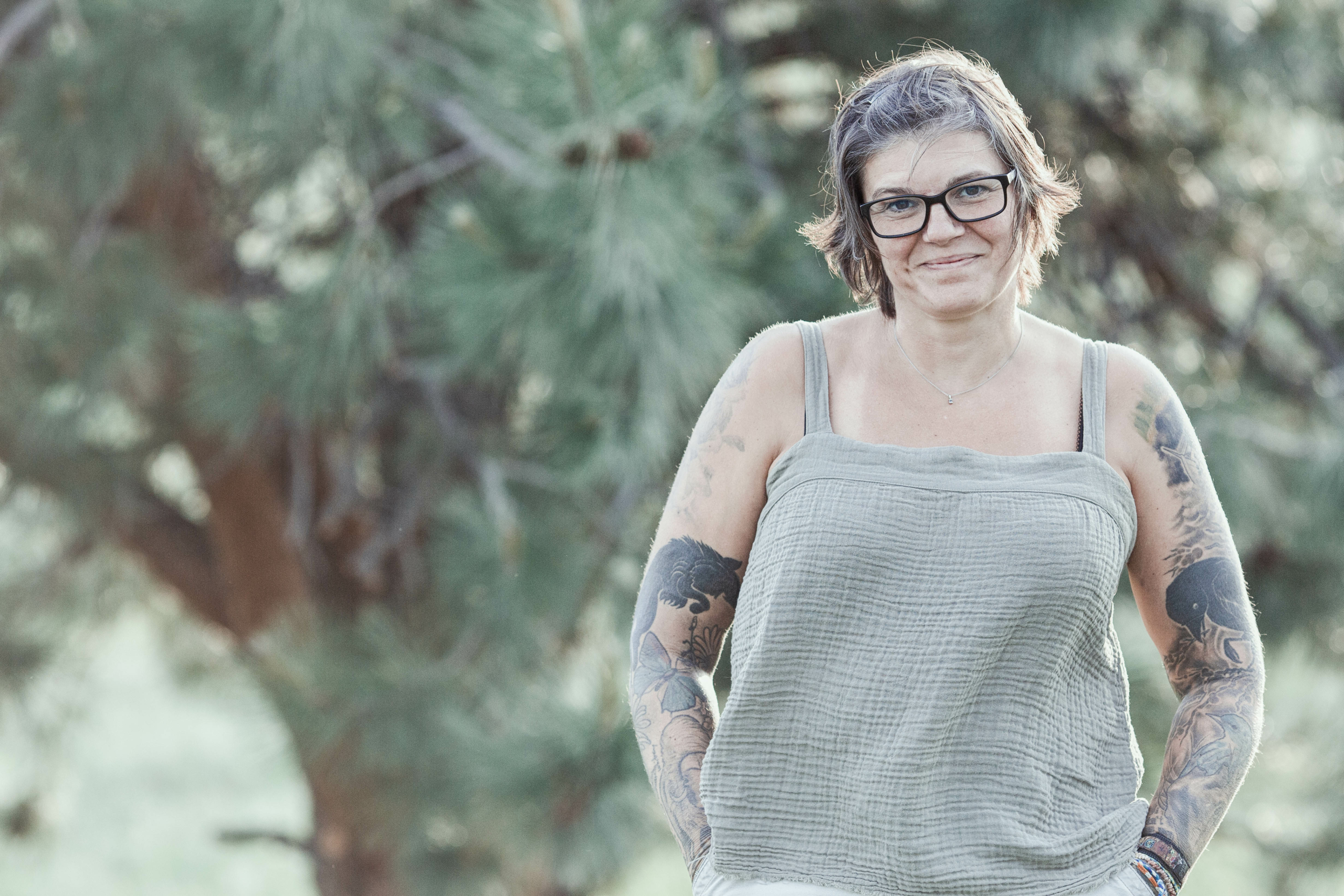Stephanie Land
BESTSELLING AUTHOR •MEMOIRIST •ECONOMIC JUSTICE ADVOCATE
BESTSELLING AUTHOR •MEMOIRIST •ECONOMIC JUSTICE ADVOCATE
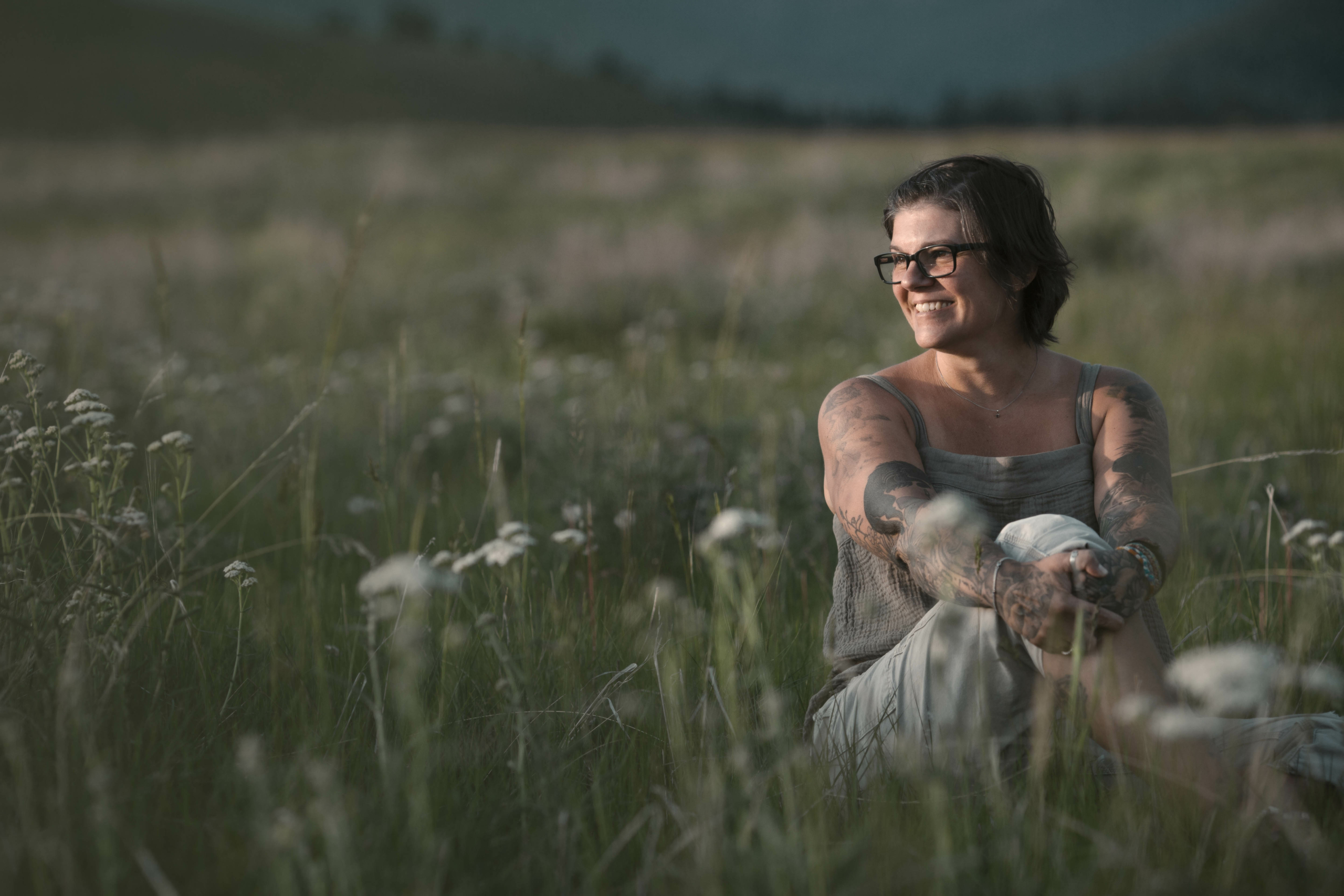

Land’s bestselling debut memoir Maid: Hard Work, Low Pay, and a Mother’s Will to Survive recounts her harrowing saga as a single mom navigating the poverty trap. Her unflinching testimony exposes the physical, economic, and social brutality that domestic workers face, all while radiating a parent’s hope and dedication.
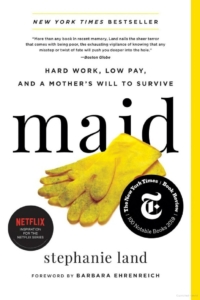 “Vivid and engaging, [Maid] illuminates the struggles of poverty… the unrelenting frustration of having no safety net, the ways in which our society is systematically designed to keep impoverished people mired in poverty.” –Roxane Gay
“Vivid and engaging, [Maid] illuminates the struggles of poverty… the unrelenting frustration of having no safety net, the ways in which our society is systematically designed to keep impoverished people mired in poverty.” –Roxane Gay
At age 28, Land’s dream of attending college and becoming a writer is deferred when she and her seven month-old have to move into a homeless shelter, fleeing a violent home and lacking any form of reliable safety net. She begins the bureaucratic nightmare of applying for food stamps and subsidized housing, and starts cleaning houses for $9/hour. Mired in patronizing government processes and paltry wages, she illustrates the trauma of grasping for stability from a rigged system, and demonstrates how hard work doesn’t always pay off. In a constant state of scarcity, a single unexpected cost–as simple as a car repair–jeopardizes Land’s carefully calculated budget, and shows the impossible slipperiness of escaping poverty.
“Land nails the sheer terror that comes with being poor, the exhausting vigilance of knowing that any misstep or twist of fate will push you deeper into the hole.” – The Boston Globe
Land’s memoir offers a unique and essential perspective from the frontlines of struggle, but the deeply personal, intimate details of her story paint a larger picture. The physical pain of her own poverty–like the mold in her apartment, and the “constant burn” and “shooting pain” from cleaning houses–clarifies systemic class inequalities, dispelling the myth that poor people are responsible for their own predicament and just need to try harder. Instead, she reveals the real culprits of her situation: domestic violence, untenable minimum wages, high housing costs, and government assistance programs that fail the people they ostensibly serve.
After years of barely scraping by, Land graduated with a bachelor’s degree in English from the University of Montana in 2014, and started a career as a freelance writer. Her viral essay for Vox, “I spent 2 years cleaning houses. What I saw makes me never want to be rich.”, later was expanded to become the New York Times bestselling memoir. The Boston Globe says of the book, “Land nails the sheer terror that comes with being poor, the exhausting vigilance of knowing that any misstep or twist of fate will push you deeper into the hole.” Maid was named as a Notable Book of the Year by The New York Time and The Washington Post, among others, and was listed among President Obama’s summer reading list for 2019.
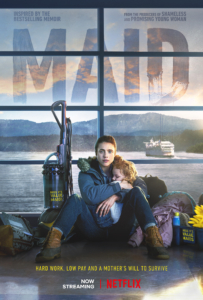 Land’s story serves as the inspiration for Netflix’s Golden Globe and Emmy Award-nominated original series Maid, starring Margaret Qualley alongside Andie MacDowell, Nick Robinson and Anika Noni Rose. A “story both captivating and relatable” (Fresh Air), Maid has drawn praise for its nuanced depictions of the realities of poverty and domestic violence. Writing in Rolling Stone, critic Alan Sepinwall observed “little things that would be forgettable elsewhere — a small job going well, a friend opening her door without judgment — land with thunderbolt force.” Land served as an executive producer on the project in addition to showrunner Molly Smith Metzler, John Wells (ER, The West Wing, Shameless), and Margot Robbie, among others. The show is one of Netflix’s most watched series ever with over 469 million hours viewed that have reached over 67 million households in its first month. According to the National Domestic Violence Hotline, the call volume in the month following the show’s premier was higher than any other month in its 25-year history.
Land’s story serves as the inspiration for Netflix’s Golden Globe and Emmy Award-nominated original series Maid, starring Margaret Qualley alongside Andie MacDowell, Nick Robinson and Anika Noni Rose. A “story both captivating and relatable” (Fresh Air), Maid has drawn praise for its nuanced depictions of the realities of poverty and domestic violence. Writing in Rolling Stone, critic Alan Sepinwall observed “little things that would be forgettable elsewhere — a small job going well, a friend opening her door without judgment — land with thunderbolt force.” Land served as an executive producer on the project in addition to showrunner Molly Smith Metzler, John Wells (ER, The West Wing, Shameless), and Margot Robbie, among others. The show is one of Netflix’s most watched series ever with over 469 million hours viewed that have reached over 67 million households in its first month. According to the National Domestic Violence Hotline, the call volume in the month following the show’s premier was higher than any other month in its 25-year history.
“A moving, intimate, essential account of life in poverty.” —Entertainment Weekly
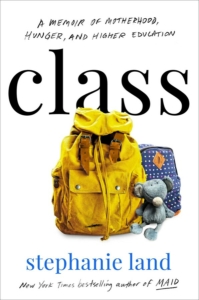 Land’s second memoir Class, out in November 2023, picks up where Maid left off as she faces the new challenges of being a poor college student and single parent. Maid was a story about a housecleaner, but it was also a story about a woman with a dream. In Class, Land takes us with her as she finishes college and pursues her writing career. Facing barriers at every turn including a byzantine loan system, not having enough money for food, navigating the judgments of professors and fellow students who didn’t understand the demands of attending college while under the poverty line—Land finds a way to survive once again, finally graduating in her mid-thirties.
Land’s second memoir Class, out in November 2023, picks up where Maid left off as she faces the new challenges of being a poor college student and single parent. Maid was a story about a housecleaner, but it was also a story about a woman with a dream. In Class, Land takes us with her as she finishes college and pursues her writing career. Facing barriers at every turn including a byzantine loan system, not having enough money for food, navigating the judgments of professors and fellow students who didn’t understand the demands of attending college while under the poverty line—Land finds a way to survive once again, finally graduating in her mid-thirties.
Land writes about economic and social justice, domestic abuse, chronic illness, and motherhood, and has been published in The New York Times, The Washington Post, The Guardian, The Atlantic, and The New York Review of Books, among many other outlets. A writing fellow at the Center for Community Change, she has worked with Barbara Ehrenreich at the Economic Hardship Reporting Project.
Land currently lives in Missoula, Montana with her two daughters, Story & Coraline, as well as her husband, Tim, and their dogs Bodhi, Juneau, and Keats.
To connect with Stephanie, please visit her on Facebook, Instagram, Twitter, and Tik Tok.
Stephanie is represented by agent Mollie Glick, Creative Arts Agency, mollie.glick@caa.com.
For speaking engagements, please contact Hannah Scott, Lyceum Agency, hannah@lyceumagency.com
For press inquiries regarding MAID, please contact Beth deGuzman, Grand Central Publishing at Beth.deGuzman@hbgusa.com.
For rights inquiries for MAID only, please contact Jeff Kleinman, at jeff@foliolit.com.
